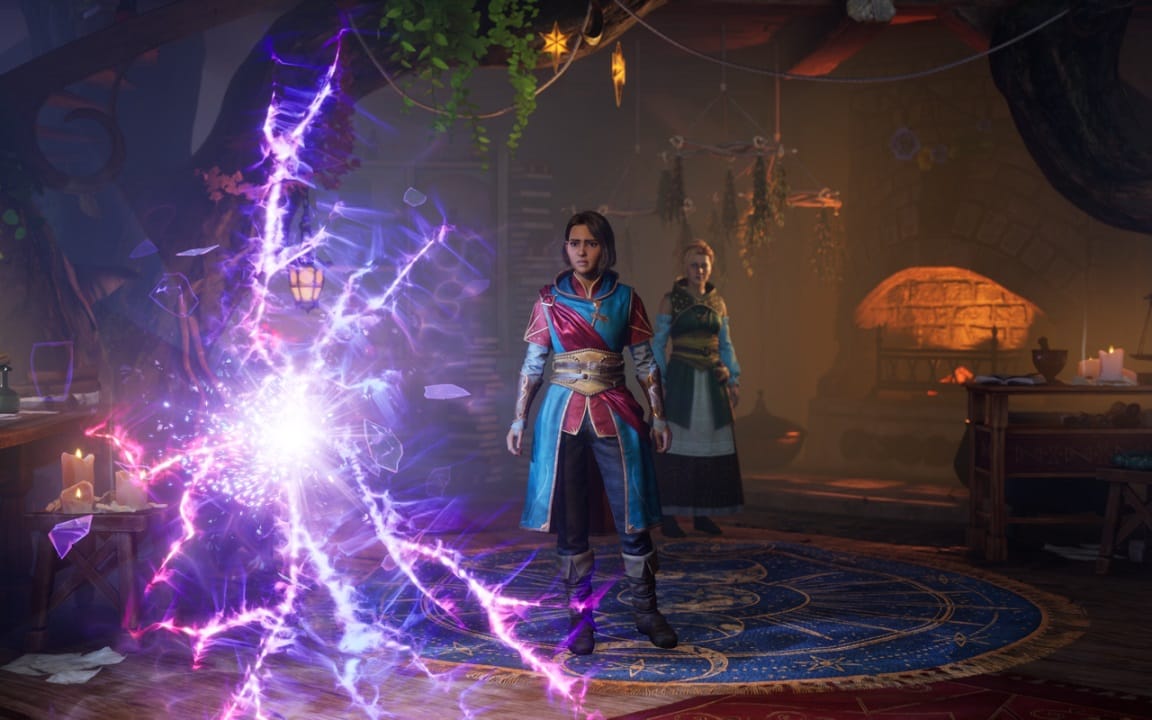Split Fiction: A Captivating Co-Op Spectacle
Connecting with the characters

Hazelight Studios is one of the most unique video game developers in recent years. After hitting it big with the release of A Way Out in 2018 through Electronic Arts’ gaming label EA Originals, they revolutionized the co-op genre with the emotionally delightful It Takes Two in 2021. The game about a couple on the verge of a divorce became one of that year's biggest video game releases, winning numerous game-of-the-year awards from various gaming publications, including the Best Game of the Year award from the Game Awards. It has now become one of the fastest-selling titles of all time, with over 20 million sales in its lifetime. Of course, everyone wondered what Hazelight was cooking up within their studio, and what they made may become their finest meal yet: Split Fiction.
We wanted to do something a bit different with this "review", so instead of gushing about the graphics or the tech behind flashing through different worlds at warp speed (we still do a bit of that), we wanted to discuss how we related to and felt when embodying the two main characters. They are the heart of the game, Mio and Zoe, bringing life and emotion to the consistently great gameplay, making a wonderful game into an all-timer of an experience.

CJ Wilson (Mio)
As someone generally more introverted, I relate to Mio's experiences as a character. Initially, I thought she would be your typical closeted rebel-type person who doesn’t like socializing with others but opens up once someone gets to know them better. This happened at the beginning of the game, but I soon realized that Mio is much more than those stereotypes or cliches you would see in popular media. I truly believe Mio has the most remarkable abilities/powers and sections in Split Fiction compared to Zoe, and I believe controlling her is the best way to play the game.
At first, I understood the story would revolve around Mio as she discovers the corrupt CEO Rader wants to steal the various authors' ideas to create his successful book publishing company by siphoning storytelling memories like Mio’s. I liked her from the jump, as she quickly learned Rader’s plans by fighting back at him and finding glitches throughout the levels to destroy his machine. But after going through the 12-15 hour journey, I learned much more about Mio internally, especially as Bryan and I understood Mio and Zoe’s subconscious towards the latter half of the game. But what I saw from Mio’s perspective profoundly mirrored my own life.
Before I begin, I surely want to say that the performances and visuals are outstanding, and some of the key principles that make it Hazelight’s best game by far. The fact that it was created by a team with 80 people on board is astounding and makes it easily one of the most impressive games released in 2025. The story deals with themes of grief, trauma, and friendship in clever and exceptional ways, making Split Fiction worth playing with a friend or family member at home or in an online co-op session.
Sections of the game are split into two genres: science fiction and fantasy. I was someone who grew up reading, watching, and playing sci-fi content since I loved witnessing these grandiose, thought-provoking stories that seemed outlandish but could also happen in our everyday lives, especially as our society gets much closer to these visions of technology, like accelerated advancements in AI. I don’t mind a good fantasy story, except when there are too many characters to keep track of, like in Game of Thrones and Lord of the Rings.
As the game progresses, I slowly see Mio's inner turmoil as she frantically shuts herself off from Zoe throughout the adventure. My dad was a middle-class working man who often worked in construction jobs like pouring concrete and building houses, similar to Mio’s dad, who worked on cars as a mechanic. My dad, unfortunately, became an alcoholic who would often drink after a long day at work, which became a debilitating problem within my family, especially with my mom. My parents soon got a divorce when I was a teenager, but luckily, my dad is still alive and is slowly moving away from his drinking habits with emotional support from my family.
I can’t say the same for Mio, as I came to find out that her father had gotten sick from cancer, eventually losing his battle with the disease. That made her want to pursue the Rader publishing deal just so she could imagine her father being proud of the hard work she put in as a writer, even if he was no longer living. By the turning point of the story where Mio and Zoe each had to face their own subconscious, I connected very much to Mio’s inner trauma, wanting to shut yourself off from the outside world by moving on in life like a tired, droning worker who just goes to work and comes home in a humdrum life with no meaning whatsoever.

Seeing Mio and Zoe working together to defeat Mio’s robotic double representing the callous, cold, emotionless side of Mio made me think about myself on a deeper level that I don’t often share with others. As someone who has been recently diagnosed with Bipolar disorder, I know what it feels like to be resentful of the world, thinking that no one will understand you, but acting out in a harsh, furious fashion will make you feel better about yourself. You don’t understand the dangerous repercussions of your actions unless your family and friends tell you what you have done.
Looking at what Mio had overcome made me feel a sense of joy inside. Knowing that no matter what you have been through, even if you have a mental health condition, you want to have a strong, encouraging system of people who will aid you in times of distress or heartache. Witnessing characters like Mio and Zoe overcome their grief is something I will never forget.
Bryan Finck (Zoe)
Though I tend to be a bit more antisocial like Mio, if I’m with someone who wants to talk and be social, I will morph into a Zoe-like character, chatting it up and trying to fill the empty spaces with conversation. Plus, I’m a sucker for a redhead with an accent, so picking Zoe as my character was practically pre-ordained.
I could tell where Zoe’s story was going as soon as she saw the carving in the tree with her and her sister’s initials. I enjoyed the tale throughout the game's 15-some hours, as the dialogue was well written and the performances were outstanding. Yet it wasn’t until near the end, while exploring Zoe’s subconscious, that the full impact of the story and the weight of her pain was revealed, and it mirrored my own.

I lost my mother to cancer just over a year ago, and watching Zoe and her sister reunite was a powerful experience in the shadow of my own grief. I’d argue that anyone who has lost someone they love, tragically or otherwise, shares the same basic dream: to have one more chance, be it for an hour, a day, or even just a moment, to spend with those they’ve lost. A chance to say what had been left unsaid, to apologize and be absolved, to give forgiveness, or just express their feelings one more time. Seeing Zoe get to hug her sister, tell her that she was sorry, and be reassured that Ella’s death wasn’t her fault, left me aching for the same chance.
When we had finished with the game, I took the time to do something I hadn’t been able to face since my mother’s passing: I wrote down the things I had done right in the weeks and months before the end, and what I wished I could go back and do over, things I could say that I never did. I hope, having done that, I can get it right when my father’s time comes, and not be left with the nagging regrets of things left unspoken. That experience, both the pain and the catharsis, is what will stay with me long after I’ve played Split Fiction for the last time.
Final Thoughts
After Bryan and I played through Split Fiction, we both had similar feelings about experiencing this emotional but thoughtful journey from Mio and Zoe. In many ways, the players working together in the same room/session will share a common bond that no other game will offer. Even if you and a friend/family member might not relate directly to the characters themselves, the themes mentioned earlier will surely affect you on an emotional and personal level that is universal to ourselves and everyone around us. If you want a lively and profound video game to play with your friend or partner, you should play Split Fiction as soon as possible.

